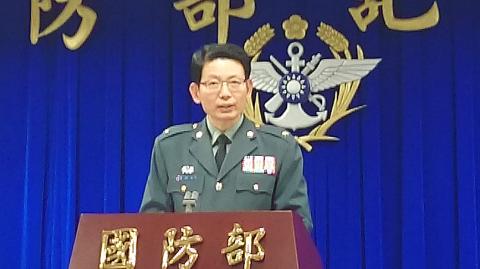The Ministry of National Defense (MND) yesterday confirmed that two military intelligence officers imprisoned in China for nearly a decade were released and returned to Taiwan in mid-October, adding that it was not related to any spy swap deal with China.
Presidential Office spokesman Charles Chen (陳以信) said the release was the result of mutual good will demonstrated by both sides of the Taiwan Strait at the landmark meeting between President Ma Ying-jeou (馬英九) and Chinese President Xi Jinping (習近平) in Singapore last month.
“President Ma is pleased to see Mr Chu [Chu Kung-hsun (朱恭訓)] and Mr Hsu [Hsu Chang-kuo (徐章國)] being able to unite with their families. He also hopes that both sides’ good-intentioned interactions can be continued and lead to more concrete results in the future,” Chen said.

Photo: Lo Tien-pin, Taipei Times
Chu, a former deputy department head of the Bureau of Military Intelligence (BMI), and Hsu, a former section chief of the bureau, were given a life sentence each for espionage while carrying out their official duties in China in 2006, MND spokesperson Major General David Lo (羅紹和) said.
After being imprisoned for more than nine years, they were released and returned to Taiwan on Oct. 13.
Lo said that after the two military intelligence officers were given a life sentence, the government had done everything possible to secure their release since 2008.
Lo also said the government expressed the highest respect and gratitude for the dedication of the two officers and the ordeals of their families and would do its utmost to take care of their interests and compensate them.
They are the highest-ranking Taiwanese agents ever to fall into Chinese hands, according to a local newspaper.
The Chinese-language China Times, which first reported news of the swap, also said Taiwan later agreed to release Li Zhihao (李志豪), a Chinese spy serving a life sentence in Taiwan, in late October, adding it was the first time that both sides of the Strait swapped spies, which it described as an “ice-breaking” move that was historically and politically significant.
However, Lo denied there was any spy swap deal.
“Their release and return to Taiwan in mid-October has nothing to do with a spy swap deal,” Lo said.
Lo said Li has served part of his term, and requested parole many times before it was granted in late October.
On whether China has requested the release of former Army Major General Lo Hsien-che (羅賢哲), believed to be the highest-ranking Taiwanese officer to be caught spying for China in nearly five decades, the ministry spokesman said he does not know anything about it and that Lo Hsien-che is still serving his life sentence.
He said there are no BMI officers still detained in China.
Of those that have been detained for assisting the work of BMI officers, he said that they were either being released through parole or after having completed their terms.
The government would do everything possible to secure the release of those who are still detained, he added.
Additional reporting by Stacy Hsu

NATIONAL SECURITY THREAT: An official said that Guan Guan’s comments had gone beyond the threshold of free speech, as she advocated for the destruction of the ROC China-born media influencer Guan Guan’s (關關) residency permit has been revoked for repeatedly posting pro-China content that threatens national security, the National Immigration Agency said yesterday. Guan Guan has said many controversial things in her videos posted to Douyin (抖音), including “the red flag will soon be painted all over Taiwan” and “Taiwan is an inseparable part of China,” while expressing hope for expedited “reunification.” The agency received multiple reports alleging that Guan Guan had advocated for armed reunification last year. After investigating, the agency last month issued a notice requiring her to appear and account for her actions. Guan Guan appeared as required,

A strong cold air mass is expected to arrive tonight, bringing a change in weather and a drop in temperature, the Central Weather Administration (CWA) said. The coldest time would be early on Thursday morning, with temperatures in some areas dipping as low as 8°C, it said. Daytime highs yesterday were 22°C to 24°C in northern and eastern Taiwan, and about 25°C to 28°C in the central and southern regions, it said. However, nighttime lows would dip to about 15°C to 16°C in central and northern Taiwan as well as the northeast, and 17°C to 19°C elsewhere, it said. Tropical Storm Nokaen, currently

‘NATO-PLUS’: ‘Our strategic partners in the Indo-Pacific are facing increasing aggression by the Chinese Communist Party,’ US Representative Rob Wittman said The US House of Representatives on Monday released its version of the Consolidated Appropriations Act, which includes US$1.15 billion to support security cooperation with Taiwan. The omnibus act, covering US$1.2 trillion of spending, allocates US$1 billion for the Taiwan Security Cooperation Initiative, as well as US$150 million for the replacement of defense articles and reimbursement of defense services provided to Taiwan. The fund allocations were based on the US National Defense Authorization Act for fiscal 2026 that was passed by the US Congress last month and authorized up to US$1 billion to the US Defense Security Cooperation Agency in support of the

PAPERS, PLEASE: The gang exploited the high value of the passports, selling them at inflated prices to Chinese buyers, who would treat them as ‘invisibility cloaks’ The Yilan District Court has handed four members of a syndicate prison terms ranging from one year and two months to two years and two months for their involvement in a scheme to purchase Taiwanese passports and resell them abroad at a massive markup. A Chinese human smuggling syndicate purchased Taiwanese passports through local criminal networks, exploiting the passports’ visa-free travel privileges to turn a profit of more than 20 times the original price, the court said. Such criminal organizations enable people to impersonate Taiwanese when entering and exiting Taiwan and other countries, undermining social order and the credibility of the nation’s